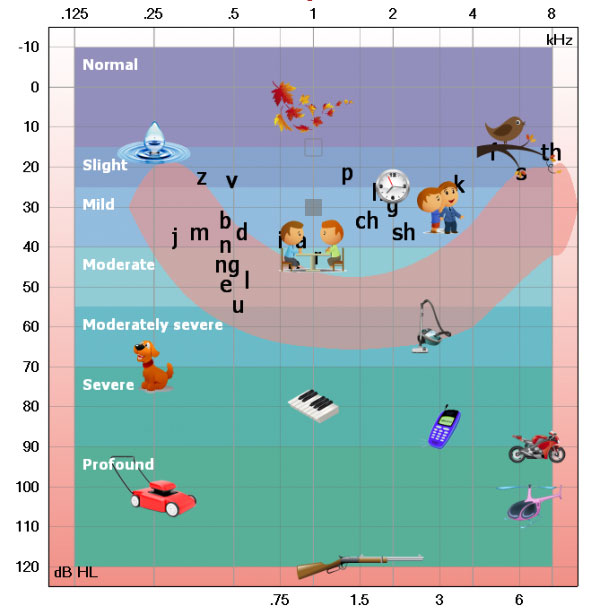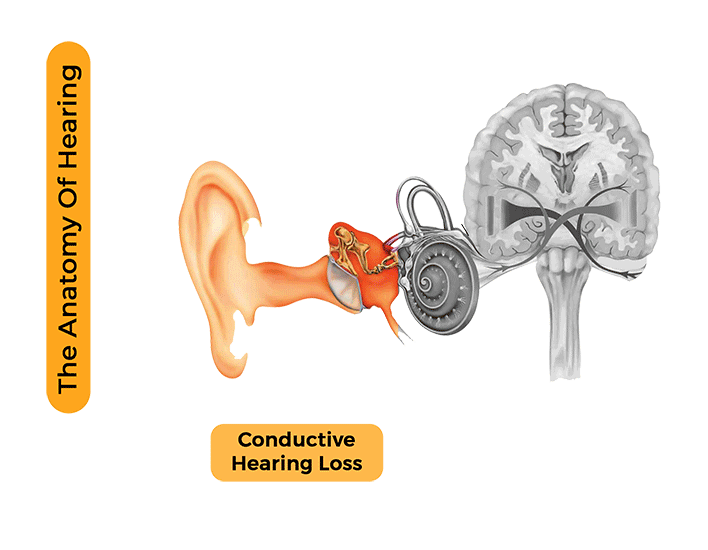-
203, Sai infotech, Patel Chowk,
near Station, Ghatkopar East, Mumbai -
+(91) 8591491922 / 8106699997
info@clhearexpert.com - Book Appointment
Hearing Loss
Hearing Loss

Degree of Hearing Loss
If you suspect that you might have some degree of hearing loss, you are probably wondering how serious it is. Compare degrees of hearing loss:
The severity of your hearing loss is usually measured in two ways:
- Loudness: How loud does a sound need to be in order for you to hear it?
- Pitch: Which frequencies are difficult for you to hear? Below are the commonly used main categories for hearing loss levels with examples of sounds that might be inaudible at a given level (based on their loudness and pitch.)

Types of Hearing Loss
- Conductive Hearing Loss - Conductive Hearing Loss is a condition that affects the outer or middle ear which prevents the sound from reaching the inner ear. Most of the time this can be treated by medicines or surgeries with a consultation to an ENT Specialist. In some particular cases Hearing Aids are also recommended.
- Sensorineural Hearing Loss - Sensorineural Hearing Loss occurs when there is damage or injury to the Inner Ear or nerve supplying the inner ear. This is most commonly seen in aged people, A consultation with Audiologist will help you to find a perfect Hearing Aid. A trial with a Hearing Aid is a must before the purchase.
- Mixed Hearing Loss - Mixed Hearing Loss is a combination of both Conductive Hearing Loss and Sensorineural Hearing Loss. Hearing Aids can help to overcome this condition. Mixed Hearing Loss is a Hearing Loss condition when both the components of Conductive Hearing Loss and Sensorineural Hearing Loss are present.

Causes of Hearing Loss
There are many causes of hearing loss, and it's important to figure out what is causing the hearing loss to determine the right treatment.
Hearing loss risk factors Any of the following scenarios increase your risk of developing gradual hearing loss
- Being over 60 years old, when age-related hearing loss is more likely to occur
- Frequent exposure to excessive noise, such as from loud machinery or gunfire
- Having a close family relative with hearing loss, or a family history of genetic disorders with hearing loss
- Having heart disease or diabetes
Less common causes of hearing loss Meanwhile, hearing loss also can be caused by any of the following conditions
- Certain medications, sometimes called “ototoxic” drugs
- Trauma or injury to the head
- Certain illnesses such as Meniere’s disease, otosclerosis or autoimmune disease
Acoustic Neuroma
Consequences of untreated hearing loss
Living with untreated hearing loss: Living with untreated hearing loss affects far more than your ability to hear. It could also affect you in the following ways:
- Your mental sharpness may decline - When you have difficulty hearing what’s going on around you, your mental sharpness may decline. This is due to a reduction of stimulation to the brain, which may impair its ability to process sound and recognize speech.
- Your risk of dementia may increase - Living with even a mild case of hearing loss can double your risk of developing dementia. The more severe the case, the greater the risk of cognitive decline. A moderate case of hearing loss, for example, triples your risk. With a severe case of hearing loss, you’re up to five times more likely to develop dementia.
- Hearing loss may impact your memory - Do you find it hard to remember what you’ve just heard? It can be difficult to comprehend and remember what’s being said when it’s a struggle to hear it in the first place. This is because the extra cognitive resources required to listen reduce the resources available for memory and comprehension.
- You may feel left out of conversations - As your hearing worsens, it becomes more challenging to follow everyday conversations. You may need to ask people to repeat themselves frequently, or you might sit closer to people so that you can read their lips or watch their facial expressions in order to understand conversations.You may even nod and pretend to understand what is being said. Jokes aren't as funny if you miss the punchline.
- Your social life may be impacted - You may find it harder to keep in touch with your circle of friends when you have difficulty hearing. It may be particularly noticeable in certain settings,such as larger gatherings or dinner parties.As a result, you may find yourself withdrawing from certain social events or declining invitations. In fact, research shows that seniors with untreated hearing loss are 20-24% less likely to participate in social activities.
- You may feel anxious - As your hearing ability declines, you may find it difficult to decipher and locate sounds around you. This may lead you to feel more insecure about your surroundings.
- You may experience more fatigue - When it’s difficult to hear, communication can be exhausting. This is because you must dig deeper into your cognitive reserves to understand. This can be particularly taxing at social events, in restaurants or in crowds where you may need to concentrate even harder to decipher what people say to you.
- Your earning potential may be impacted - Untreated hearing difficulties can impact your earning potential as it can impact your performance at work. When you don't hear clearly, you risk missing key information in meetings or directives from supervisors.
